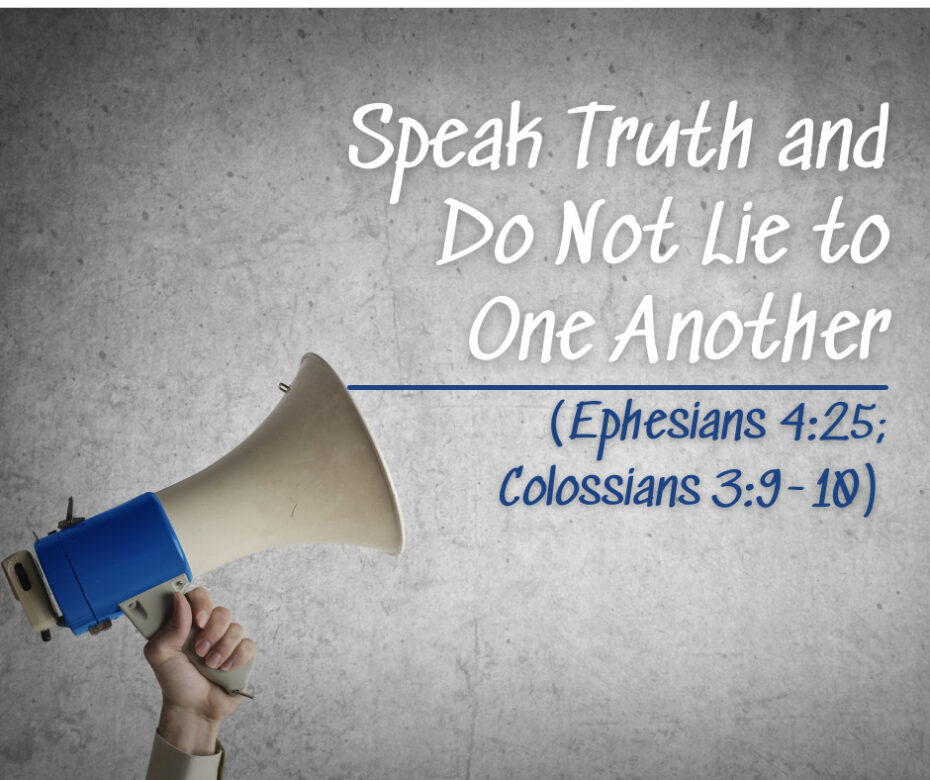Our culture has a truth crisis.
You can see the crisis at work on many levels.
For example, you can see it in journalistic bias, where unquestioned “facts” seem to change week by week.
And the confusion over fact and fiction is unmistakable in the crazy posts shared on social media by friends who can’t seem to distinguish between satire and serious journalism.
It is also evident in the transgender debate, where society is supposed not just to pretend but to actually believe that men and women can change their biology (see this excellent article by Abigail Shrier on “Gender Ideology Run Amok”).
And finally, the truth crisis permeates ivory tower debates over what it means for something to be true. Is truth what works, what coheres together, what experts can agree upon, or what corresponds to reality? Is there any truth at all?
Our culture has a truth crisis, which makes these two “one another” commands all the more relevant to the church:
Therefore, putting away lying, “Let each one of you speak truth with his neighbor,” for we are members of one another (Eph 4:25).
Do not lie to one another, since you have put off the old man with his deeds, and have put on the new man who is renewed in knowledge according to the image of Him who created him (Col 3:9-10).
Here is the standard for a normal church life: Christians should not lie to one another but speak the truth.
Lying means saying something that you know is false, to deceive. I think lies are relatively easy to avoid, in the sense that you know when you’re lying.
But speaking the truth to one another is much harder to do. Why is that? Think back to the problem of biased news. For example, should a journalist present his own opinions as if they were facts? No. That’s called “editorializing,” and careful journalists try hard to avoid it. That’s why newspapers have “opinion” sections—because expressing your opinions is not the same as reporting the news.
Should journalists present something uncertain or unverified as if it were unquestionably true? No.
Or should a reporter assume what an interviewee would say and report as if she said it? Of course not. He needs to question the interviewee, listen carefully to her answers, and report them accurately.
Do you see why speaking the truth is hard? Because knowing the truth takes effort! Sadly, in a 24-hour news cycle, truth often gets trampled by journalists stampeding to be the first to break a story without knowing if it’s true or not.
What if Christians were really concerned about the truth? A church community that tried to live up to those standards would take the time to investigate facts, verify claims, consider arguments, hear counterarguments, and refrain from presenting opinions, guesses, and assumptions as if they were true. Frankly, doing your due diligence takes work! And yet, that’s what speaking the truth requires. What if the Christian community was like that? What if we were serious about investigating and speaking the truth in the middle of a culture with a truth crisis?
Jesus said He is the way, the truth, and the life (John 14:6). At a minimum, that means that everything Jesus taught is true, such as the promise of everlasting life. But Jesus is the truth in a much deeper and more awe-inspiring sense. Since the world came into being through Him (John 1:3), all facts about the world are really His facts—because it’s His creation. And since everything holds together in Him (Col 1:17), the reason why we can have truth at all is that Jesus makes it possible. In other words, since reality is Christocentric, and since truth is correspondence to reality, then truth is Christocentric.
No wonder Paul emphasized the importance of speaking the truth—as the Body of Christ, we should correspond to Jesus in our thoughts, actions, and in our words.


